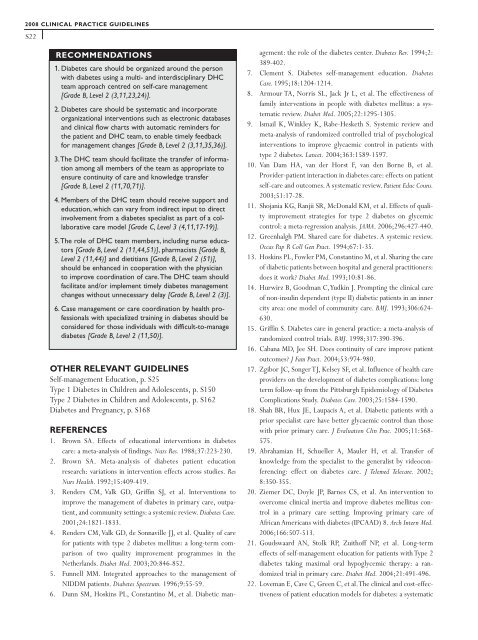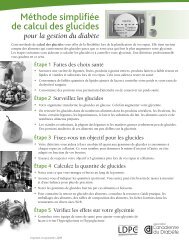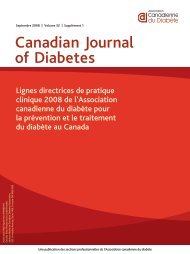2008 Clinical Practice Guidelines - Canadian Diabetes Association
2008 Clinical Practice Guidelines - Canadian Diabetes Association
2008 Clinical Practice Guidelines - Canadian Diabetes Association
Create successful ePaper yourself
Turn your PDF publications into a flip-book with our unique Google optimized e-Paper software.
<strong>2008</strong> CLINICAL PRACTICE GUIDELINES<br />
S22<br />
RECOMMENDATIONS<br />
1. <strong>Diabetes</strong> care should be organized around the person<br />
with diabetes using a multi- and interdisciplinary DHC<br />
team approach centred on self-care management<br />
[Grade B, Level 2 (3,11,23,24)].<br />
2. <strong>Diabetes</strong> care should be systematic and incorporate<br />
organizational interventions such as electronic databases<br />
and clinical flow charts with automatic reminders for<br />
the patient and DHC team, to enable timely feedback<br />
for management changes [Grade B, Level 2 (3,11,35,36)].<br />
3.The DHC team should facilitate the transfer of information<br />
among all members of the team as appropriate to<br />
ensure continuity of care and knowledge transfer<br />
[Grade B, Level 2 (11,70,71)].<br />
4. Members of the DHC team should receive support and<br />
education, which can vary from indirect input to direct<br />
involvement from a diabetes specialist as part of a collaborative<br />
care model [Grade C, Level 3 (4,11,17-19)].<br />
5.The role of DHC team members, including nurse educators<br />
[Grade B, Level 2 (11,44,51)], pharmacists [Grade B,<br />
Level 2 (11,44)] and dietitians [Grade B, Level 2 (51)],<br />
should be enhanced in cooperation with the physician<br />
to improve coordination of care.The DHC team should<br />
facilitate and/or implement timely diabetes management<br />
changes without unnecessary delay [Grade B, Level 2 (3)].<br />
6. Case management or care coordination by health professionals<br />
with specialized training in diabetes should be<br />
considered for those individuals with difficult-to-manage<br />
diabetes [Grade B, Level 2 (11,50)].<br />
OTHER RELEVANT GUIDELINES<br />
Self-management Education, p. S25<br />
Type 1 <strong>Diabetes</strong> in Children and Adolescents, p. S150<br />
Type 2 <strong>Diabetes</strong> in Children and Adolescents, p. S162<br />
<strong>Diabetes</strong> and Pregnancy, p. S168<br />
REFERENCES<br />
1. Brown SA. Effects of educational interventions in diabetes<br />
care: a meta-analysis of findings. Nurs Res. 1988;37:223-230.<br />
2. Brown SA. Meta-analysis of diabetes patient education<br />
research: variations in intervention effects across studies. Res<br />
Nurs Health. 1992;15:409-419.<br />
3. Renders CM, Valk GD, Griffin SJ, et al. Interventions to<br />
improve the management of diabetes in primary care, outpatient,<br />
and community settings: a systemic review. <strong>Diabetes</strong> Care.<br />
2001;24:1821-1833.<br />
4. Renders CM,Valk GD, de Sonnaville JJ, et al. Quality of care<br />
for patients with type 2 diabetes mellitus: a long-term comparison<br />
of two quality improvement programmes in the<br />
Netherlands. Diabet Med. 2003;20:846-852.<br />
5. Funnell MM. Integrated approaches to the management of<br />
NIDDM patients. <strong>Diabetes</strong> Spectrum. 1996;9:55-59.<br />
6. Dunn SM, Hoskins PL, Constantino M, et al. Diabetic man-<br />
agement: the role of the diabetes center. <strong>Diabetes</strong> Rev. 1994;2:<br />
389-402.<br />
7. Clement S. <strong>Diabetes</strong> self-management education. <strong>Diabetes</strong><br />
Care. 1995;18:1204-1214.<br />
8. Armour TA, Norris SL, Jack Jr L, et al. The effectiveness of<br />
family interventions in people with diabetes mellitus: a systematic<br />
review. Diabet Med. 2005;22:1295-1305.<br />
9. Ismail K, Winkley K, Rabe-Hesketh S. Systemic review and<br />
meta-analysis of randomized controlled trial of psychological<br />
interventions to improve glycaemic control in patients with<br />
type 2 diabetes. Lancet. 2004;363:1589-1597.<br />
10. Van Dam HA, van der Horst F, van den Borne B, et al.<br />
Provider-patient interaction in diabetes care: effects on patient<br />
self-care and outcomes.A systematic review. Patient Educ Couns.<br />
2003;51:17-28.<br />
11. Shojania KG, Ranjii SR, McDonald KM, et al. Effects of quality<br />
improvement strategies for type 2 diabetes on glycemic<br />
control: a meta-regression analysis. JAMA. 2006;296:427-440.<br />
12. Greenhalgh PM. Shared care for diabetes. A systemic review.<br />
Occas Pap R Coll Gen Pract. 1994;67:1-35.<br />
13. Hoskins PL, Fowler PM, Constantino M, et al. Sharing the care<br />
of diabetic patients between hospital and general practitioners:<br />
does it work? Diabet Med. 1993;10:81-86.<br />
14. Hurwirz B, Goodman C,Yudkin J. Prompting the clinical care<br />
of non-insulin dependent (type II) diabetic patients in an inner<br />
city area: one model of community care. BMJ. 1993;306:624-<br />
630.<br />
15. Griffin S. <strong>Diabetes</strong> care in general practice: a meta-analysis of<br />
randomized control trials. BMJ. 1998;317:390-396.<br />
16. Cabana MD, Jee SH. Does continuity of care improve patient<br />
outcomes? J Fam Pract. 2004;53:974-980.<br />
17. Zgibor JC, Songer TJ, Kelsey SF, et al. Influence of health care<br />
providers on the development of diabetes complications: long<br />
term follow-up from the Pittsburgh Epidemiology of <strong>Diabetes</strong><br />
Complications Study. <strong>Diabetes</strong> Care. 2003;25:1584-1590.<br />
18. Shah BR, Hux JE, Laupacis A, et al. Diabetic patients with a<br />
prior specialist care have better glycaemic control than those<br />
with prior primary care. J Evaluation Clin Prac. 2005;11:568-<br />
575.<br />
19. Abrahamian H, Schueller A, Mauler H, et al. Transfer of<br />
knowledge from the specialist to the generalist by videoconferencing:<br />
effect on diabetes care. J Telemed Telecare. 2002;<br />
8:350-355.<br />
20. Ziemer DC, Doyle JP, Barnes CS, et al. An intervention to<br />
overcome clinical inertia and improve diabetes mellitus control<br />
in a primary care setting. Improving primary care of<br />
African Americans with diabetes (IPCAAD) 8. Arch Intern Med.<br />
2006;166:507-513.<br />
21. Goudswaard AN, Stolk RP, Zuithoff NP, et al. Long-term<br />
effects of self-management education for patients with Type 2<br />
diabetes taking maximal oral hypoglycemic therapy: a randomized<br />
trial in primary care. Diabet Med. 2004;21:491-496.<br />
22. Loveman E, Cave C, Green C, et al.The clinical and cost-effectiveness<br />
of patient education models for diabetes: a systematic











